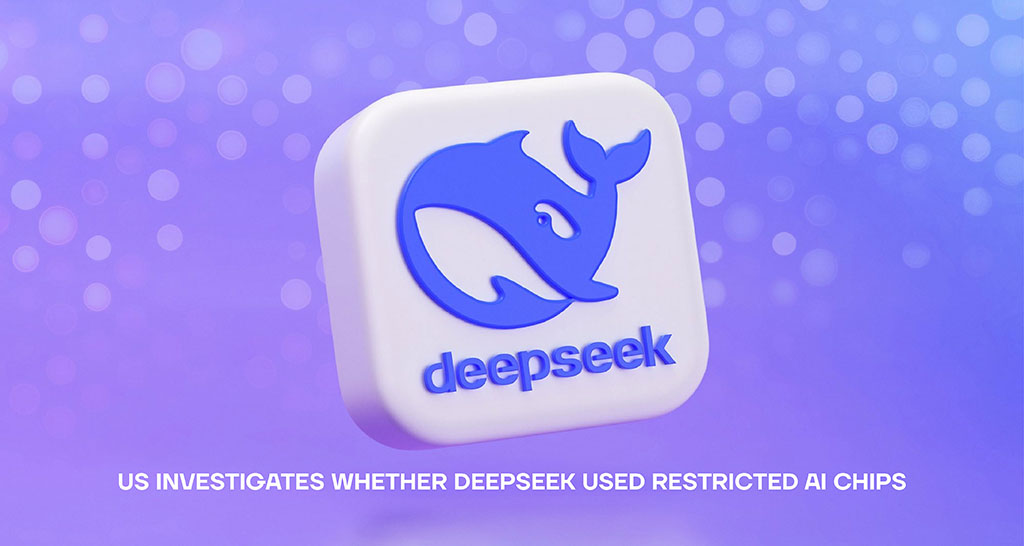The United States government is presently examining whether DeepSeek, a leading AI startup, has breached export control regulations by utilizing restricted artificial intelligence (AI) chips in its activities. This inquiry arises amid increased scrutiny regarding the application of advanced technology in sensitive sectors, especially concerning the creation of AI systems that could impact national security. The possible improper use of restricted AI chips, deemed sensitive and subject to export limitations, may result in serious repercussions for both DeepSeek and the wider AI industry.
What Are Restricted AI Chips?
Restricted AI chips refer to semiconductor processors deemed crucial for sophisticated machine learning and artificial intelligence applications. These chips represent the forefront of technological advancement and are utilized in high-performance computing, data analysis, and deep learning tasks. A limited number of companies, primarily Nvidia, Intel, and AMD, manufacture these chips, which are distributed under stringent government regulations. The U.S. government has established export controls on specific AI chips, especially those with the capability to handle extensive data at remarkable speeds. Such measures are implemented to prevent sensitive technology from falling into the hands of adversaries or other entities that might exploit it in ways that could jeopardize U.S. national security.
Certain high-performance AI chips are currently subject to regulations that prohibit their sale or export to specific nations, including China and Russia, unless explicit government authorization is obtained. These restrictions are in place due to concerns that such chips may be utilized in the advancement of technologies that could pose a challenge to the United States in fields like cybersecurity, military applications, and overall technological dominance. Furthermore, these chips are essential for the creation of next-generation AI systems, which have the potential to transform various sectors, including autonomous vehicles, healthcare, and defense.
DeepSeek’s Role in the Investigation
DeepSeek, an artificial intelligence firm renowned for its advanced machine learning algorithms, has emerged as a significant contributor to the technology sector in recent years. Established by former engineers from prominent organizations such as Google, Microsoft, and Tesla, this startup has created pioneering AI models that utilize extensive datasets and advanced processing methods. These models have found applications in diverse fields, including financial forecasting, medical research, and autonomous robotics.
The organization has garnered considerable investment and interest from both private entities and government agencies because of its cutting-edge AI technologies. Nevertheless, the current inquiry into potential violations of export control regulations by DeepSeek arises from apprehensions regarding its acquisition of specific AI chips. Sources knowledgeable about the situation indicate that the chips involved are thought to be included on a restricted list, which prohibits their sale to certain nations without prior government authorization.
The inquiry remains in its preliminary phases; however, it has generated considerable apprehension regarding the possibility of sensitive technology being misappropriated or sold to foreign entities. Should DeepSeek be determined to have breached these regulations, the organization may encounter substantial penalties, legal repercussions, or potentially the revocation of its business license. The ramifications of such a breach could reach well beyond DeepSeek, indicating a trend towards stricter regulations on AI technology and a movement towards enhanced scrutiny of the AI industry.
Broader Implications for the AI Industry
The current inquiry into DeepSeek reflects a broader movement towards heightened examination of artificial intelligence firms, especially those engaged with sensitive technologies. As artificial intelligence becomes more prevalent and influential, governments globally are acknowledging the necessity of regulating the creation and implementation of these systems to prevent potential misuse. This trend is expected to persist as AI assumes a more pivotal position in both civilian and military domains.
The ongoing investigation may act as a cautionary tale for the wider AI sector regarding the critical need for adherence to export control laws and the serious repercussions that may arise from non-compliance. Organizations engaged in the AI field must establish strong systems to monitor and regulate the utilization of restricted technologies. Neglecting to implement such measures could lead to significant penalties, affecting not only individual firms but also the industry.
Conclusion
The investigation by the United States into DeepSeek’s potential use of restricted AI chips highlights the escalating apprehension regarding the impact of advanced technologies on national security. As artificial intelligence progresses and gains greater capabilities, governments are likely to encounter mounting pressure to impose regulations on the creation and implementation of these technologies. The situation surrounding DeepSeek emphasizes the critical need for adherence to export controls and the possible repercussions for organizations that do not comply with these standards. For the AI sector, this inquiry may signify the onset of a new phase of examination and regulation, as the U.S. government aims to preserve its technological supremacy while protecting national security interests.
